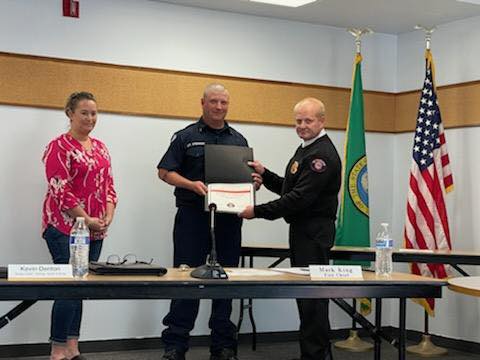Information and facts on Proposition 1


All general news stories will be filed under this category.
Information and facts on Proposition 1

Thurston County has implemented a burn ban starting July 5th, 2023. Read this announcement from ORCAA’s website to learn more:
Thurston County Implements Fire Safety Burn Ban starting July 5, 2023
Jul 05, 2023 07:53 am
The Thurston County Fire Marshal, in consultation with the Thurston County Director of Emergency Services, Department of Natural Resources, and the Olympic Region Clean Air Agency (ORCAA), determined weather conditions within the county meet the fire danger level necessary to enact restrictions on outdoor burning to all lands regulated by Thurston County.
The Fire Safety Burn Ban applies to residential yard waste burning and all land clearing burns. The restrictions on outdoor burning during the summer have resulted in a significant drop in brush fires and property damage each of the past several years, according to fire officials.
“The fire safety burn ban is enacted when weather and fire fuel conditions reach a level of danger that may pose a threat to people and their property,” said Fire Marshal, Joshua Cummings. “The Department of Natural Resources has moved their fire risk on public lands in our region to ‘moderate’ which triggers the county’s process to enact the fire safety ban to minimize the threat of fires as much as possible through the restriction of residential and land clearing burns.”
At this time, recreational fires are allowed on private residential properties and in established fire rings within official county, state, and federal campgrounds. Recreational fires must be contained in approved concrete, stone or metal pits like those commonly found in campgrounds. The use of charcoal briquettes, gas, and propane BBQs will continue to be allowed under the burn ban.
The Thurston County Outdoor Burn Ban is effective as of 8 a.m., Wednesday, July 5, 2023, and ending Sept. 30, 2023. More information about burn bans is available at https://www.thurstoncountywa.gov/departments/board-county-commissioners/burn-ban-information
We’re excited to being having an Open House at Station 21 in Yelm!
It will run from 11 AM to 3 PM.
Join us at our headquarters Station 21 (709 Mill Rd SE., Yelm, WA). Bring the whole family, learn more about SE Thurston Fire Authority, kid’s activities, meet your local firefighters, and check out the fire engines. We hope to see you there!
Plus, we have an extra special treat for you! Grab some FREE tacos! They’re limited, so be early!

Even when the outside temperatures are high, water temperatures in the Thurston County area can be cold enough to overwhelm even the strongest swimmer. Sadly, SETFA responds to preventable drownings every year.
If you plan to be in or near water this summer, follow these recommendations:
Learn to swim, including water safety and survival skills — To enjoy the water safely, learn swim strokes, water safety, survival skills, and becoming comfortable in the water.
Wear a life jacket — Always wear a U.S. Coast Guard approved life jacket when boating, tubing, rafting, swimming or other activities in or on lakes, rivers, salt water, or pools without a lifeguard.
Swim where there is a lifeguard — Swim in areas with lifeguards when possible. Wear a life jacket while swimming in unguarded waters or until the guards start their service.
Supervise children in or near water — Always provide close and constant attention to children you are supervising in or near water. Stay within touching distance of young children at all times.
Do not use alcohol or drugs during water activities — Never use alcohol or other impairing drugs during water and boating activities or while supervising children around the water. Alcohol affects balance, coordination, and judgement. Exposure to sun and heat worsen these effects.
Learn first aid and CPR — Learn first aid and CPR. Seconds count—the more quickly lifesaving CPR is started, the better the chances of recovery. Dial 911 in an emergency.
 At this weeks board of commissioners meeting we formally celebrated a landmark accomplishment of a promotion. Congratulations to S.E. Thurston Fire Authority Dan Stewart on his promotion to Lieutenant! Lieutenant Stewart’s wife had the honor of pinning his badge. Thank you for your years of service and service to the community!
At this weeks board of commissioners meeting we formally celebrated a landmark accomplishment of a promotion. Congratulations to S.E. Thurston Fire Authority Dan Stewart on his promotion to Lieutenant! Lieutenant Stewart’s wife had the honor of pinning his badge. Thank you for your years of service and service to the community!
The weather is nicer and the sun is out more with summer here. We know you’re going to be doing more outside, including grilling, so we thought it was a good time to remind everyone to be safe while you enjoy the outdoors!
The Washington State Patrol has posted a list of safety tips on their website (here).
Originally posted on the Fire Protection Blog
Fire extinguishers don’t last forever. All fire extinguishers will expire at some point but there is not always a strict expiration date. As the first line of defense for a fire, it is important that you make sure your extinguishers are still functional and well maintained.
The lifespan of a fire extinguisher varies based on a few factors including:
According to NFPA standards, disposable fire extinguishers need to be replaced every 12 years and rechargeable fire extinguishers must be recharged every 6 years. A disposable fire extinguisher has a plastic head with a gauge that reads “full” or “empty”. Rechargeable extinguishers have a metal head with a gauge that reads “charge” or “recharge”.
Some extinguishers have a recommended replacement date set by the manufacturer. However, there are many extinguishers without strict expiration dates which can make it hard to tell when it should be replaced. Every month, you should do a visual check of your fire extinguishers to make sure that they are still functional. Some things you should look out for include:
Certain types of fire extinguishers are now considered obsolete as regulations change or technology advances. NFPA guidelines dictate which types of extinguishers should be removed from service. If you have an older fire extinguisher, you should consult with an experienced fire protection provider to determine whether it is obsolete.
Getting your fire extinguishers inspected, tested, and serviced according to NFPA and manufacturer recommendations can help to extend the lifespan of your equipment.
Fire safety is an important subject to discuss, especially with young ones. However, the discussion you have with a child in kindergarten versus a child in 6th grade are two different approaches. A good resource for information for both of those age groups (and those in between, of course) is Firesafekid.org. They have separate sections with information for grades K-3 and for grades 4-6.
Fire safety is a very important topic. Once they start, fires can spread quickly. You should have a plan in place to get out, should a fire start, but here is a list of tips for fire prevention:
Originally posted on the National Fire Protection Association website.
We deal with loud environments often: concerts, construction sites, etc. It can be physically painful if the ambient noise is loud enough. Because of this, it makes sense that many people avoid such settings in an attempt to avoid hearing problems in the future.
If this is true, then why are fire alarms so loud?
NFPA 72 outlines the requirements for fire alarm notification appliances, which take two primary forms: audible and visible.
It’s well known that repeated exposure to loud noises can be damaging to your hearing. The National Institute on Deafness and Other Communication Disorders (NIDCD) states that 85 dB and higher is the danger zone for hearing loss.
Here are some comparative noise examples to help you understand the loudness of different decibels:
The goal of a fire alarm is to make sure everyone in the building knows to evacuate. That’s why the NFPA requires fire alarm horns and sirens to sound louder than ambient noises.
The precise requirement is 15 dB above the average noise level or 5 dB above the maximum ambient sound, whichever is greater. This means it may be appropriate to program fire alarm horns to 75 dB for a restaurant or office setting, but an industrial facility with loud equipment may need to sound off closer to the maximum 120 dB level to ensure the sound stands out from other ambient noises.
The high volume requirement for fire alarms accounts for the fact that distance from the horn decreases its perceived volume, and building materials absorb noise, especially if the doors are closed between rooms. Due to these factors, the decibel level must be high at the source to ensure the sound travels to every corner of the building.
When you hear the shrill noise of a fire alarm, your first instinct is to cover your ears. This is actually an effective way to defend against hearing loss while you walk calmly toward the exit and make your way out of the building.
More importantly, however, is to create a fire evacuation plan and hold fire drills regularly. This way, everyone is confident about what steps to take and where to evacuate in case of an emergency. By planning ahead, you can limit confusion and reduce the time you’re exposed to loud volumes.